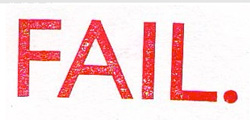How to deal with intellectual property left over from failed startups?
 Jaisen Mathai , an employee of Yahoo, asks a good question: What to do with intellectual property left over from failed startups that can be useful to society?
Jaisen Mathai , an employee of Yahoo, asks a good question: What to do with intellectual property left over from failed startups that can be useful to society? Most startups fail, and many of them have software, patents, or other intellectual property that can be useful to society. This intellectual property could help other startups to avoid wasting time on reinventing the bike, finding creative solutions to problems, and so on. In a perfect world, the best part of this property would be sold on the market or transferred to open use. Many developers would be happy to see the life of their creations in other projects. But the problem is that all this intellectual property is still property and belongs to someone even after the startup has gone bankrupt. If a company attracted venture capital investments, or had other lenders, then after a bankruptcy, intellectual property rights are transferred to them. Only in rare cases, it is sold out in order to return at least some funds to creditors. This is exactly what happened with Edgeio, the company where I co-founded and went bankrupt last year. Most of the intellectual assets were sold to a third party, and the proceeds went to payments to those who participated in the development of these assets. But in most cases, entrepreneurs are so exhausted that they just turn around and leave, and creditors have no idea whether any remaining intellectual property or not. Also, investors have neither the time nor the desire to find out the real value of their remaining assets. It is even more difficult to find an example of how entrepreneurs spent their time in order to translate development into open use. Another reason that development is often simply forgotten is the fact that intellectual property, as a rule, has a limited lifespan (before others simply do not recreate it).
But I know how to change this situation. Lenders and investors could agree in advance by adding a supplementary agreement to the contract that any intellectual property that allegedly has any value will be transferred to a third-party organization to analyze and determine its value (financial or any other). This organization may decide to sell what has a price, keeping a percentage of the proceeds as a commission (this will give them an incentive to find value where it is), and simply transfer the code or something else that is potentially interesting to the public, but having little direct commercial value. This third-party organization will need funding and the proceeds from the sale of intellectual assets will most likely not be able to cover operating expenses. Perhaps the creation of such an organization would be a good project for a university or a group of universities. Students and teachers may have an academic interest in it. The prospect of implementing such projects may seem rather vague, but the idea of Creative Commons used to seem just as crazy. In any case, it may be an interesting experiment.
')
Source: https://habr.com/ru/post/31548/
All Articles